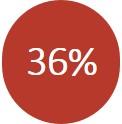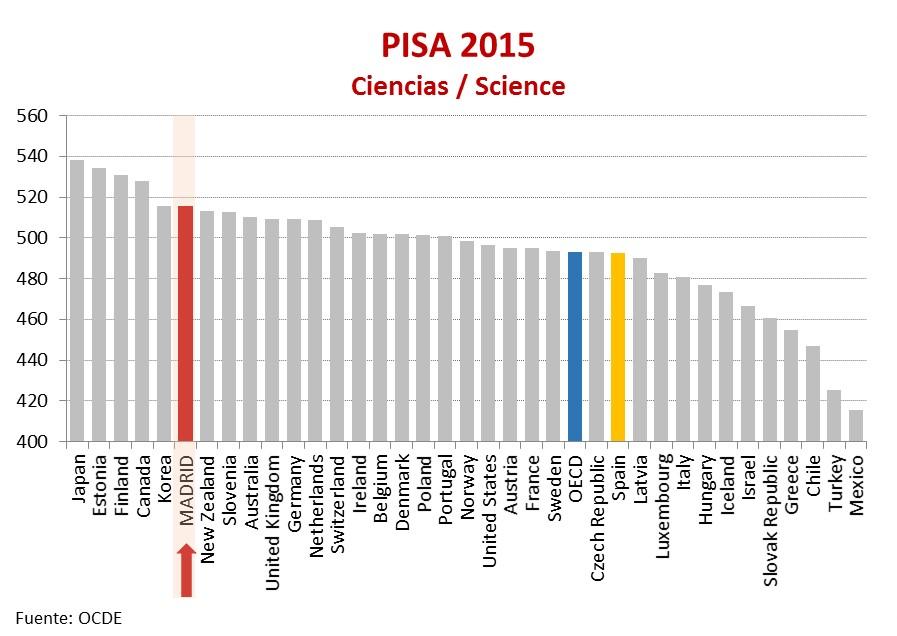
Talent pool and an outward-looking education system
Qualified and competitive professionals and an outward-looking education system.
A highly qualified labour force
The Community of Madrid has a dynamic population and an enormous level of vitality. A good part of the Madrid population is made up of citizens from other regions of the country and from different parts of the world who have opted to live and work in our region.
Madrid is also one of the regions in Europe with the highest percentage of the population holding higher education qualifications.
This blend of cultural diversity and high-level qualification make the Region of Madrid one of the main talent hubs in the whole of Europe.
- The Community of Madrid has, according to the Active Population Survey (EPA) for the 2nd Quarter of 2018, 3.397.700 people working or willing to work.
- This figure represents 15% of the total active population of Spain.
- According to the INE, the activity rate of a territory is defined as the quotient between the total assets and the population of 16 and over. In the Community of Madrid, this is the largest in Spain and amounts to 62,84% in the 2º Quarter of 2018, compared to 58,80% of national average.
- This is the result of one of the most dynamic work environments along with having the greatest employment opportunities in Spain.
- 47% of the active population has a university degree (31,4% in the EU-28, according to Eurostat 2017)
An outward-looking education system
The Community of Madrid is home to 6 public universities, 8 private universities, and the headquarters of the National Distance Education University (UNED); Likewise, in Madrid there are 15 higher artistic education centers, 6 public and 9 private authorized, which represents the highest concentration of students in Spain and one of the largest in Europe.
In total, more than 300.000 students are being educated in these institutions. This significant amount of university education in Madrid contritbutes to the important contingent of students from other regions of the State and from very diverse foreign countries, mainly Spanish-American and European.
The number of students enrolled in the region, in the course 2018-2019, Has been of:
- 196.400 in the centers of public universities
- 15.920 in the centers attached to public universities
- 65.045 in private universities and the Catholic Church
- 6.663 at the Distance University of Madrid (UDIMA)
- 33.549 in the associated centers of Madrid and Madrid-Sur of the UNED
En total, they are receiving education in these institutions 317.577 students.
In addition, Spain is, since 2001, the first destination chosen by Erasmus students and its capital, Madrid, the preferred city in Spain.
The reasons for this influx are three-fold:
- Academic: based on the broad and diversified range of degrees available, many of which are taught in other languages, mainly English, and due to our reputable universities.
- Positive socioeconomic environment: since the Community of Madrid is a region with great dynamism capable of providing young students with great employment prospects and professional development.
- Cultural and leisure: Madrid is recognised as a culturally diverse and inclusive city which makes it an ideal place for students.
Main data of the university system of the Community of Madrid in 2019:
- 317.577 students in Madrid universities
- 230 undergraduate degrees
- 109 double degree degrees
- 70 degrees in English
- 831 official master's degrees
- 4.396 awarded doctoral theses (2017)
- 22.534 foreign students (of degree, 1er and 2º cycle), 11.405 (of official master) in Madrid's universities (2017)
Business schools based in the Region of Madrid are a key point of professional projection, both nationally and internationally.
Four business schools based in the Region of Madrid have obtained the so-called "triple crown", the recognition from the main accreditation bodies of graduate programs taught in business schools:
- IESE Business School, with campuses in Madrid, Barcelona and New York
- IE Business School, in Madrid
- Esade Business School, with facilities in Barcelona and Madrid
- ESCP Europe School of Management, with campuses in Madrid, Paris, Berlin, London and Turin.
An open, diverse and cosmopolitan society
- Madrid is a highly attractive location for tourists from any corner of the world. Its role as an international destination is growing rapidly, which attracts new inhabitants of other cultures.
- 26% of the population of the Community of Madrid comes from other Spanish regions.
- 13% of the population is of foreign origin, representing more than 180 different nationalities.
Spanish is our language, but it does not stop there...
- The citizens of Madrid have the important asset of the Spanish language, the second language with the greatest spread in the world: about 576 million speakers have Spanish as their first or second language and another 500 million study our language as a foreign language.
- But in addition, the presence of citizens from other countries, as well as the gradual improvement in the linguistic skills of the people of Madrid, makes it possible that the availability of workers who speak English, French, Portuguese or Italian has increased enormously.
Educating the talent of tomorrow
Madrid offers one of the best education systems out of those available in other Spanish regions, with high levels of quality in both public and private schools.
Approximately 650 schools and institutes have launched bilingual education programmes in Spanish and English.
36 out of the 100 best schools in Spain are located in Madrid.
In Madrid is home to some of the most important international schools: British Council, Hastings School, International College Spain, King's College, Lycée Français, The English Montessori School, Scoula Italiana, Deutsche Schule and the American School.
According to the OECD, education in Madrid is among the best in the world
The results of the last PISA report (2015) show that the students from Madrid surpass those of the whole of Spain in reading comprehension as well as in science and mathematics.
The average result of assessments carried out in the Region of Madrid is much higher than the average of the OECD countries, ranking among those of the most advanced countries.












